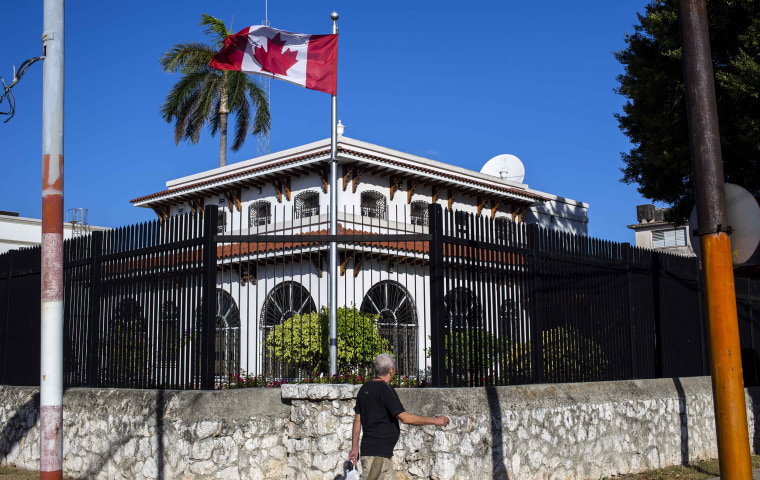WASHINGTON — A group of Canadian diplomats is accusing Canada's government of withholding information about what the diplomats say are three new cases of brain injury resulting from "Havana Syndrome" that have been identified in the past two years.
In a letter obtained by NBC News, the diplomats said "at least three additional cases were identified in 2019 and 2020" of the mysterious illness that also affected U.S. personnel in Cuba. In its most recent public update about new cases, in January 2019, Canada's government said "the last confirmed case of unusual health symptoms" had been in 2018.
"The distortion of information misleads the public and causes significant risk to new personnel being sent to Cuba, as they are not being fully apprised of the risks to which they are exposed," the diplomats wrote.
The letter, sent last week to Canadian Foreign Affairs Minister Marc Garneau by nine Canadian diplomats who served in Cuba and reported strange symptoms, was a point-by-point response to a briefing Canada's government gave in February to diplomats who served in Cuba between 2017 and 2020.
The diplomats say that in the briefing, which took place virtually and included more than 40 people, they were notified that Canada plans to increase its staffing at its embassy in Cuba, more than two years after Canada cut its staff there in half in response to the incidents. The diplomats say the government justified that move by saying there had been no new brain injuries reported since 2018.
"In fact, this is not accurate," the diplomats write.
They say that since March 2020, a total of 25 Canadian diplomats have been evaluated for potential brain injury by experts at Dalhousie University, the institution tapped by Canada's government to assess the diplomats' health.
It's unclear how many of those were ultimately diagnosed with brain injuries. But two people familiar with the diplomats' allegations said at least some of those whose injuries were identified in 2019 and 2020 have already had workers' compensation claims for brain injury approved by the Canadian government.
Global Affairs Canada, the equivalent of the U.S. State Department, did not answer specific questions from NBC News about the number of Canadian cases and staffing plans for its embassy in Cuba, citing an ongoing lawsuit brought by some of the diplomats.
"Since the beginning of the health incidents, the health, safety and security of our diplomatic staff and their families remains a priority," said Christelle Chartrand, a Global Affairs Canada spokeswoman. "The department cannot comment on a matter that remains before the courts."
Starting in 2016, U.S. and Canadian diplomats and other government workers stationed in Havana started falling ill, many after hearing strange sounds and experiencing bizarre physical sensations. A number of U.S. workers in China and other countries later reported similar experiences as well and were evacuated for evaluation.
The incidents caused hearing, balance and cognitive changes along with mild traumatic brain injury, also known as concussion.
Canada, like the U.S., has said it hasn't determined a cause or culprit for what the U.S. initially deemed targeted "attacks." A study commissioned by Canada's government pointed the finger at likely overexposure to pesticides in Cuba, while a report in December by the U.S. National Academies of Science said the mysterious neurological symptoms are consistent with directed microwave energy and raised the possibility of a microwave weapon.
"We know Russia has had some of these directed energy waves since the '70s," Sen. Jeanne Shaheen, D-N.H., told NBC News Chief Foreign Affairs Correspondent Andrea Mitchell this week. "Too much information has been classified. There hasn't been enough willingness share with Congress, with the public what has really been going on."
Cuba has denied any responsibility for the symptoms suffered by diplomats or having weapons that could produce such symptoms. "I can guarantee you that this is completely false," Col. Ramiro Ramirez, chief of diplomatic security for the Cuban Interior Ministry, told NBC News in 2017.
In the letter, first reported by Canada's Global News, the diplomats recount being informed by Canada's government in February that the Royal Canadian Mounted Police, Canada's national police force, is still investigating and "actively engaged" in discussions with U.S. and Cuban authorities, with plans to make a "technical visit" to Havana soon.
But the diplomats are citing "unacceptable delays" in making progress on that investigation and on coordinating care for Canadians affected, a group that includes numerous children who were in Cuba alongside their parents. The diplomats say they're still waiting for Canada's government to finalize an agreement with Dalhousie University for children to be assessed for brain injury.
"Three to four years after our children were injured, there is a serious question of the relative value of these assessments given the unwarranted delay, if this agreement is ever finalized," the diplomats wrote. "In the meantime, our children have struggled with headaches, learning problems, visual, hearing and speech impairments, tinnitus and other ailments. Who knows what the long-term impacts will be?"

